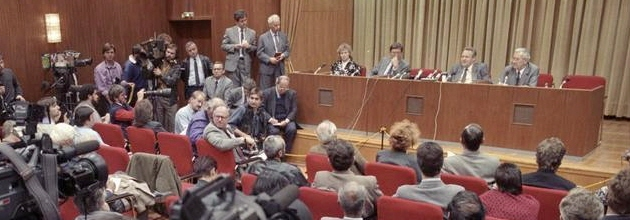I have read and reviewed several German History books here on the site and of course they were always of my choosing, irrespective of the books’ popularity or newness. When trying to come up with a book list for 2010, one of the questions I asked myself was, “What are the Germans themselves reading these days about their own history?”
Because that is somewhat of an interesting question, I thought that it could, in itself, become the topic of at least one blog post.
So here I present to you the top three German History books — in the German language — being ordered at Amazon’s German store (Amazon.de). Of course, the Amazon ranking will likely have changed by the time you read this, so I’ll be specific and say that these are the top three as of 23:00 CET on 07 January 2010. Also, to be clear, I have not read any of these three books yet.
Here goes:
Guido Knopp, Die Sternstunden der Deutschen. The title can be roughly translated as “The Germans’ Greatest Moments” (I enjoyed reading the commentary at the LEO online dictionary about how to translate “Sternstunde”. Perhaps “Sidereal Moments” would be better? ;)) Knopp is a journalist/historian who has had a long string of successful television documentaries in Germany, in addition to several books (many of which have made it into English). From its description, I see that this book celebrates German achievements such as the mass production and availability of aspirin (Bayer is a German company), the introduction of health insurance, etc. In all, one hundred events are chronicled, finishing up with the 2007 Academy Award given to the film “The Lives of Others” (also available at Amazon UK, CA and DE).
As the description on the book’s Amazon page makes clear, only positive events are chronicled in this particular book. I assure you Knopp cannot be accused of being a glorifier of German history — he’s also published books with titles such as Hitler’s Henchmen and The SS: A Warning from History.
When I saw that this book is tops in the German history category at Amazon.de, I realized that I’ve been seeing quite a bit more of this type of thing — celebrations of Germany — over the last few years. I know some commentators have noted that Germany’s hosting of the 2006 World Cup — the Sommermärchen, or Summer Fairy Tale, as it’s called by Germans — may have marked a turning point in the German people’s perception of itself. I lived here in neighboring Austria — with lots of German television — during that World Cup and I can say without a doubt that it was a very positive experience in which the Germans took great pride.
Anne Frank, Anne Frank Tagebuch. This is, as you no doubt guessed, Anne Frank’s Diary (also at Amazon UK and CA.)
I think you all know about this book! Have you read it lately? If you read it many years ago in school, you should know that the later editions might have material that you didn’t originally see, so it’s worth a fresh look.
I don’t think there is any kind of external factor — such as a film — pushing this book’s popularity right now in Germany, so I’m guessing it’s probably always among the top few in the German history category at Amazon.de.
[UPDATE: I think it’s important to point out that, while I can understand why the book might appear in the “German History” category at Amazon.de — in addition to other categories, I would hope –, Anne Frank actually kept this diary while living in Holland and writing in Dutch, her family having fled Germany.]
And finally, Richard von Weizsäcker, Der Weg zur Einheit. This book, the title of which translates to “The Road to Unity”, is Richard von Weizsäcker’s political memoir. Weizsäcker served as the President (head of state) of Germany from 1984 to 1994, a decade which included the fall of the Berlin Wall (1989) and the re-unification of the two Germanies (West and East) into a single Federal Republic of Germany (1990). In their description of the book, the Amazon.de editors point out that Weizsäcker belongs to that ever-diminishing group which they describe as the “last veterans who saw the most important moments of recent German history with their own eyes” (my translation.)
Weiszäcker was 12 years old when Hitler took power in 1933, he served in the German army during the Second World War and later became an influential CDU politician, culminating in his two terms as president. So he has indeed seen a lot of German history with his own eyes, and I’m sure his memoir therefore makes for good reading. Unfortunately, it appears to be available only in German.
So there you have it, the three most popular German History books at Amazon’s Germany site. The first celebrates German accomplishments, of which we know there are many. The second represents tragedy and remembrance. The third, I imagine, shines a light on both the awful and the promising notes of 20th Century German history.
Keep reading!
Best,

Bill Dawson













